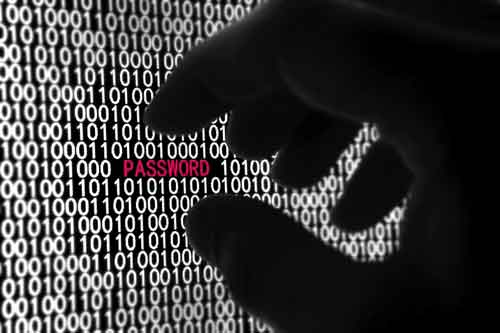


(File photo)
A Chinese national named Su Bin pleaded guilty in the US on Wednesday to conspiring to hack into the computer networks of several major US defense contractors to obtain sensitive information, according to a US Department of Justice statement. The information allegedly includes technical files about F-22 and F-35 fighter jets and C-17 military transport aircraft.
The statement says "Su Bin admitted to playing an important role in a conspiracy, originating in China," where he has two accomplices. Some US media have conjectured that the two accomplices must be Chinese military personnel.
Su was arrested in Canada in July 2014, and was handed over to the US this February. The Chinese government has denied any involvement in Su's case, and the Chinese Ministry of Foreign Affairs has asked the US to ensure the privacy and legal rights of Chinese citizens on US soil.
Plea bargaining is a common US judicial practice. Defendants can plead guilty in exchange for softer punishments. The disadvantage of this practice is that it is hard to know what the defendants truly think, and whether there might be any wrongs in the judgments.
Every country is gathering intelligence. The largest and most well-known information-collecting agencies are the CIA and FBI in the US. The FBI has even listed China as their top target. Recent years have seen the FBI arresting quite a few "Chinese spies," but most of them proved to be innocent. In the meantime, China has kept a low profile in reporting the exposure of US spies out of various considerations.
In most cases, governments won't acknowledge these spies after they have been caught. For example, whenever China intercepted spies from Western countries, the governments they served routinely denied any connection and even mobilized the Western media to attack China's human rights and win over sympathy.
We have no reliable source to identify whether Su has stolen these secrets and transferred them to the Chinese government. If he has, we are willing to show our gratitude and respect for his service to our country. On the secret battlefield without gunpowder, China needs special agents to gather secrets from the US. As for Su, be he recruited by the Chinese government or driven by economic benefits, we should give him credit for what he is doing for the country.
If Su was wronged and forced to plead guilty, he should have our sympathy. As the "war of information" between China and the US continues, there will probably be more Chinese framed as spies and jailed in the US. This is a tragedy of the times, and we hope the Chinese working in sensitive professions in the US can protect themselves.
At the helm of international public discourse, the US is able to define whether certain activities are espionage or not. When US espionage is exposed, the US media will try to divert public attention and tone down the case. But when the CIA or FBI catches suspects, hyperbole about these cases makes headlines in US media.
The most infamous case is that of Edward Snowden, who revealed the global US surveillance program PRISM. The whistleblower is wanted by the US government, which refuses to reflect on its behavior, but keeps criticizing China for espionage without solid proof.
China lags behind the US in technology. The existence of US cyberspace military forces is openly known to the public, and its capability is way higher than Chinese "hackers." But it doesn't mean that China cannot fight back in the face of ill-founded US accusations of Chinese spies. China should uncover Washington's brazen hypocrisy with concrete evidence.
 Thai most beautiful transgender Nong Poy release new photos
Thai most beautiful transgender Nong Poy release new photos Now and then photos of Shanghai Jiaotong University
Now and then photos of Shanghai Jiaotong University Is this what air travel will look like in 2050?
Is this what air travel will look like in 2050? Aerial view of watermelon terraces in S China's Baise
Aerial view of watermelon terraces in S China's Baise Traditional wedding of a post-80s Tibetan couple
Traditional wedding of a post-80s Tibetan couple Models in cheongsams present classical oriental beauty
Models in cheongsams present classical oriental beauty Second commissioned C28A corvette made by China enters Algerian Navy
Second commissioned C28A corvette made by China enters Algerian Navy Intoxicating Wuyuan in spring
Intoxicating Wuyuan in spring Gold and silver wares of Qing Dynasty exhibited in Shenyang Imperial Palace
Gold and silver wares of Qing Dynasty exhibited in Shenyang Imperial Palace Top 20 hottest women in the world in 2014
Top 20 hottest women in the world in 2014 Top 10 hardest languages to learn
Top 10 hardest languages to learn 10 Chinese female stars with most beautiful faces
10 Chinese female stars with most beautiful faces China’s Top 10 Unique Bridges, Highways and Roads
China’s Top 10 Unique Bridges, Highways and Roads Tax rumors spur buying of foreign products
Tax rumors spur buying of foreign products  Mekong cooperation has promising future
Mekong cooperation has promising future  Nuclear tests, border crimes change Chinese people’s attitude to N.Korea
Nuclear tests, border crimes change Chinese people’s attitude to N.Korea  Transplanted New Yorkers talk culture shock and urban affinities from the fast pace of Manhattan to the hutong of Beijing
Transplanted New Yorkers talk culture shock and urban affinities from the fast pace of Manhattan to the hutong of Beijing Day|Week